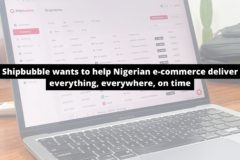By focusing on training and providing digital infrastructure and services, Amazon is pointing to where it sees value in the African market.
Amazon Web Services (AWS), the cloud computing division of the global e-commerce giant, Amazon, has launched a business accelerator for financial technology companies in Africa. The new program is a sign of Amazon’s growing ambitions on the continent and the direction of this ambition.
Hosted by AWS’ Startup Loft Accelerator, the program will focus on fintech and fintech-adjacent startups operating in Africa. African fintech companies receive the most venture capital funding compared to other technology categories.
In 2022, fintech startups in Africa raised over $2 billion in venture funding out of over $5 billion invested in African startups. AWS is now inviting early-stage fintech companies to apply to join the inaugural edition of the AWS FinTech Africa Accelerator. Applications end on the 27th of April.
2004 marked Amazon’s first entry into Africa. That year, the barely ten-year-old company set up a development centre in Cape Town, South Africa for its cloud-computing unit, AWS. The development centre focused on research to create cutting-edge networking technologies and next-generation customer support software. The investment paid off, and the South African development centre was responsible for Amazon EC2, the virtual server service that allows developers to host and build scalable applications on the cloud, paying only for what they use.
In 2015, AWS opened an office in Johannesburg, and in 2017 the company deepened its South African presence by bringing the Amazon Global Network to Africa through AWS Direct Connect. By May 2018, Amazon had brought Amazon CloudFront to Cape Town and Johannesburg increasing AWS’ 138 points of presence globally to 141. The company also began to offer Amazon Route 53, AWS Shield, and AWS WAF through South Africa. In 2020, Amazon opened its first African data centres in South Africa.
In November last year, AWS announced that it was opening an office in Lagos.
By honing its strategy to focus on providing digital hardware and software infrastructure through data centres and AWS, Amazon is pointing to where it sees value in the African market. And it is still not retail e-commerce. If you look at Amazon’s historical relationship with Africa, it is not difficult to see the (South Africa concentrated) pattern. The US giant has been hesitant to bring its retail business and ruthlessly efficient delivery service to the continent. But Amazon believes in the continued growth of Africa’s digital infrastructure and services market. There is a good reason for that. In 2018, according to research from market research firm, Xalam Analytics, demand for data centre services in Africa rose two to three times faster than supply.
Africa is currently served by three AWS data centres two of which are in South Africa and the third in Nairobi, Kenya.
By targeting new technology companies AWS, and by extension, Amazon is signalling that it wants to build early relationships with Africa’s future tech giants — their future target customers. Slowing revenue and net income is forcing the giant retailer to seek new spaces to grow its customer base. “We’re trying to build a set of relationships that outlast all of us,” Amazon CEO, Andy Jassy, said at the 2022 Q4 earnings call with investors and analysts in February. AWS already counts large African corporations and several startups as customers. Including Absa, Old Mutual, DPO, JUMO, Mukuru, and Travelstart, among others.
By contrast, the company’s other efforts on the continent have not been as smooth. A proposed $280 million project for an Africa HQ has been tangled in litigation and resistance by indigenous groups who say the construction will desecrate sacred lands. Amazon runs a logistics hub serving its middle east and north African business from Egypt, in northern Africa. In 2017, Amazon acquired Souq.com, Egypt’s largest e-commerce retailer at the time, for $580 million.
The AWS FinTech Africa Accelerator will train chief executive and chief technology officers in strategy, tech team management, product development, and helping founders prepare for navigating the complexities of fundraising. Amazon will not be taking equity in the companies, nor will it offer venture debt. Startups that are selected will join AWS’ Activate program which will provide founders with up to $25K USD in Activate Credits, and other services. Founders will also participate in workshops and one-on-one sessions with industry experts to address specific challenges their company faces.





















